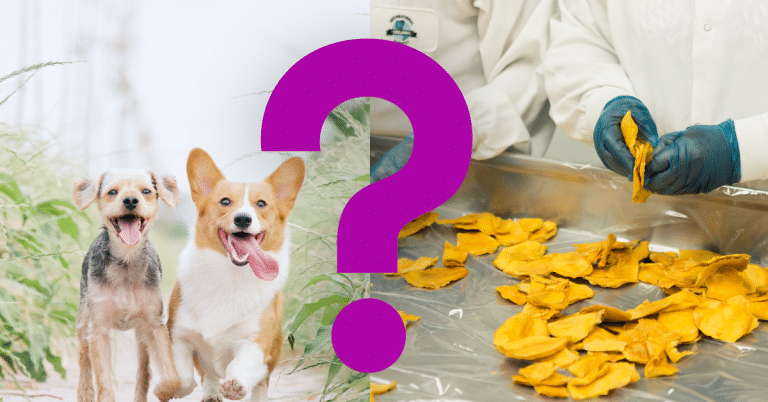Can Dogs Eat Dragon Fruit? A Vet’s Opinion

Dragon fruit is a tropical fruit with a somewhat sweet taste that some compare to a cross between a kiwi, a pear, and a watermelon. It’s substantial in fiber and antioxidants. But can you feed dragon fruit to your dog?
Yes, dogs can consume dragon fruit, but only in moderation and with caution. Dogs can eat dragon fruit, but it is not a natural component of their diet and should not be a staple food. Dragon fruit seeds and skin may be problematic for dogs to digest, causing stomach distress. Before feeding your dog dragon fruit, remove the skin and seeds and watch for any signs of discomfort or ill reactions. Before introducing new food to your dog’s diet, consult your veterinarian.
Benefits Of Dragon Fruit For Dogs
Dragon fruit, also known as pitahaya or pitaya, is a tropical fruit that contains various minerals that are helpful to dogs. The following are some of the potential benefits of dragon fruit for dogs:
Vitamins And Minerals
Dragon fruit is high in vital vitamins and minerals such as vitamins C, E, B6, and many minerals such as iron, calcium, and phosphorus. These nutrients can aid a dog’s immune system, skin and coat health, and bone development.
Low In Calories And Fat
Dragon fruit is a low-calorie fruit with little fat, making it an excellent choice for dogs who need to maintain a healthy weight or are on a weight-management program. It can be a low-fat, healthful treat for dogs who are prone to obesity or have weight-related health issues.
Fiber
Dragon fruit contains a lot of fiber, which can help with digestion and promote regular bowel movements in dogs. Adequate fiber consumption in dogs can help prevent constipation and support overall gastrointestinal health.
Hydrating
Dragon fruit has a lot of water, which can help dogs stay hydrated, especially in hot weather or after physical exertion. Water is essential for a dog’s overall health, including renal function and skin health.
Antioxidant Properties
Dragon fruit includes natural antioxidants such as vitamin C and betacyanins that can help neutralize damaging free radicals in a dog’s body. Antioxidants can aid immune system support, reduce inflammation, and prevent illness.
Despite these possible advantages, it is critical to remember that dragon fruit should only be provided to dogs in moderation and as part of a well-balanced diet. It should not be considered a staple meal. You should always contact your veterinarian before adding new food to your dog’s diet, especially if your dog has any current health concerns or dietary restrictions. Additionally, before feeding the dragon fruit to your dog, remove the peel and seeds, as the seeds and skin can be challenging to digest and may cause gastrointestinal discomfort.

How To safely Give Dragon Fruit To Dogs
Here are step-by-step guidelines for giving dragon fruit to dogs safely:
Choose Ripe Dragon Fruit: Choose a ripe dragon fruit that is firm, has bright-colored skin, and is free of mold, bruising, and other spoilage indications. Ripe dragon fruit should smell somewhat sweet.
Wash the fruit: Before handling or cooking the dragon fruit, properly wash it with clean water to remove any dirt or impurities on the skin. It will help guarantee that your dog eats clean and safe fruit.
Remove the skin and seeds: Gently slice off the top and bottom of the dragon fruit with a sharp knife. Then, along the length of the fruit, make a shallow cut, being careful not to cut too deeply. Peel the skin off gently, as you would a banana. After removing the skin, you will be left with the fruit’s flesh. Remove any seeds and cut the flesh into small, bite-sized pieces. Seeds can be difficult for dogs to digest.
Feed in Moderation: Dogs should only be offered dragon fruit as a treat, not as a regular part of their diet. Due to its high sugar and fiber content, too much fruit, even dragon fruit, might disturb a dog’s digestive tract. Generally, treats should not exceed 10% of a dog’s daily caloric intake.
Monitor for adverse reactions: After giving your dog a tiny amount of dragon fruit for the first time, closely observe them for any signs of discomfort or unpleasant reactions, such as vomiting, diarrhea, or changes in behavior or appetite. If your dog exhibits unfavorable responses, discontinue feeding dragon fruit and visit your veterinarian.
Consider Your Dog’s Specific Requirements: Not all dogs tolerate dragon fruit well; some may have allergies or sensitivities to specific fruits. Furthermore, dogs with specific medical concerns, such as diabetes or gastrointestinal issues, may need to avoid or limit their consumption of fruits like dragon fruit. Before introducing new food to your dog’s diet, consult your veterinarian.
Will Dragon Fruit Make A Dog Sick?
While dragon fruit is typically healthy for dogs to consume, excessive consumption or inappropriate feeding, such as with the skin or seeds, might cause stomach discomfort in particular dogs. Dragon fruit seeds and peel can be complex for dogs to digest and may induce gastrointestinal discomforts such as vomiting, diarrhea, or stomach pain.
Furthermore, dragon fruit is heavy in natural sugars and fiber, which may not be well accepted by dogs suffering from certain medical disorders, such as diabetes or gastrointestinal issues. Dogs with pre-existing health issues, allergies, or sensitivities may be more sensitive to dragon fruit or new food.
Can dogs eat dragon fruit variations?
When giving dragon fruit to dogs, it is generally advisable to stay with the classic or common kind, also known as pitahaya or pitaya. Dragon fruit comes in several varieties, including red-fleshed and white-fleshed varieties, and various skin colors. Still, they are all typically suitable for dogs to eat in moderation if the skin and seeds are removed.
However, it is crucial to remember that different varieties of dragon fruit may have varying nutrient profiles or flavors, which may alter how well dogs tolerate them. Red-fleshed dragon fruit, for example, may have more natural sugars than white-fleshed fruit, which could be a problem for dogs with diabetes or weight management concerns.

Vet’s Summary
With the skin and seeds removed, dragon fruit can be safely fed to dogs in moderation. Selecting ripe fruit, carefully washing it, then chopping it into little, bite-sized pieces is critical. Dragon fruit should be fed as a treat only, not as a standard component of a dog’s diet, and should be introduced gradually to avoid any unpleasant responses. Because different varieties of dragon fruit may have distinct nutrient profiles or flavors, contact with a veterinarian is advised.
In addition to feeding dragon fruit in moderation, probiotic supplements may be helpful to your dog. Probiotics are beneficial microorganisms that help dogs maintain good gut function, promoting better digestion and overall well-being. Probiotic supplements designed expressly for dogs can give a concentrated amount of these good bacteria, which may be especially beneficial for dogs with digestive disorders or a varied diet. However, before beginning any new supplements for your dog, please consult with your veterinarian, as they may make personalized suggestions based on your dog’s particular health needs.
Videos To Watch
If you are wondering if you can give your dog dragon fruit, watch this:
And if you want to know what a dog can NOT eat, watch this:






